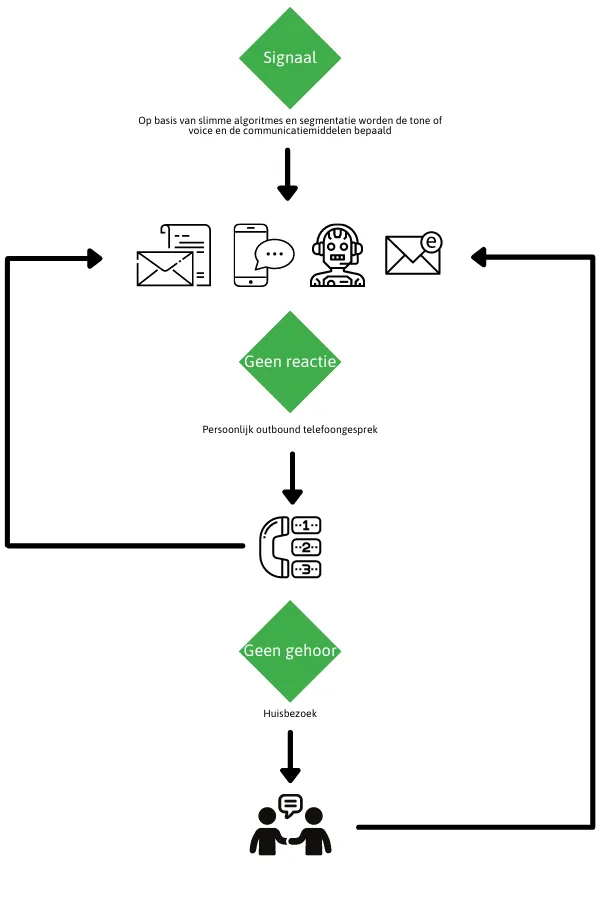Optimal approach to early detection
Since 1 January 2021, the Municipal Debt Counseling Act has been in force. With the help of this law, municipalities can provide help earlier when citizens are in danger of financial problems due to debts. In order to provide these citizens with the right help, it is very important that you, as a municipality, come into contact with them. However, the follow-up of an early warning sometimes fails in many municipalities. The causes: different priorities, capacity limitations, or the absence of policies for this process. And that is a shame, because the citizen is ultimately the victim of this. A personal, digital and automated process can bring a solution.

Reaching is solving
This may sound like a death eater, but nothing could be further from the truth. You often see that when a citizen is reached - and thus the conversation is started - a solution can be found for a debt. That is why reaching out to citizens is the most important part of early detection.
How do you communicate with citizens?
Being in debt is a sensitive topic. If you continuously point out to someone that they have debts (and that this is a problem), this can cause additional blockages. It is therefore very important that you approach the citizen in the right tone. In addition, not every citizen is the same and you cannot reach everyone via the same communication channel at the same time.
Use the right words
Don't use words with a negative meaning. Even if these words are actually not negative at all. Take the word “debt counseling.” This is often incorporated into communication. Entirely with the best intentions, but it often causes a shock response among citizens. After all, he is afraid of such a process and builds his or her wall a little further. So don't hesitate to ask various experts how you can best approach someone with a debt.
Segment
By segmenting, you can address citizens much more directly and specifically. For example, messages can be compiled based on certain variables. This includes gender, age, type of disadvantage or the amount of the disadvantage. Based on each segment, you can compose and send the most personal text possible.
Use different means of communication
Every citizen has his or her own personal preference when it comes to the preferred means of communication. As a municipality, respond to this. Make sure you use different means of communication to reach people. This can be done, for example, via an email, text message, letter, push notification, telephone conversation or a personal visit. The more communication tools you use early on, the sooner you are able to reach out to citizens.
Optimal delivery
In addition to using the correct language and the various means of communication, the time of delivery or visits also has a lot of influence on the reach. Vary and experiment with times. Don't always call in the standard time slots, schedule a home visit in the evening or early in the morning and ensure that digital messages are delivered when the citizen reads them immediately.
Automated and digitized, yet personal; a golden combination
When debt or payment problems are detected, it is necessary to contact the person concerned as soon as possible. Automated, digital and, above all, personal communication can make a big difference here. It is important that communication is directed at a point of contact, possibly determined by the citizen himself. If there is no response, a call can be made. If the citizen cannot be reached even now, the home visit team can be sent by.
What does such an optimized flow look like?

Profit for citizens and municipalities
By automating and digitizing the contact moments, citizens can be contacted more quickly and via various channels, often even without the intervention of an official. When this is linked to the correct tone of voice in the message, this ensures a higher success rate of getting in touch. In addition, the pressure on the municipality is being reduced and officials can focus more on the important aspects of debt prevention, namely actually helping citizens solve the debt.


.webp)